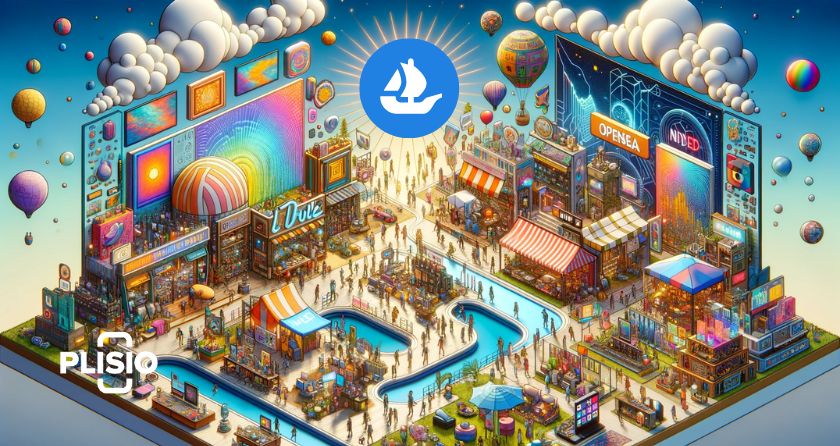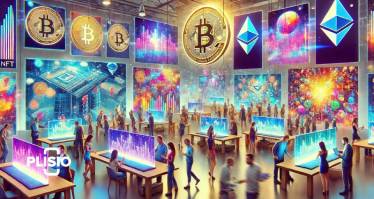What Is OpenSea? The Most Popular NFT Marketplace

If you've been hearing a lot about non-fungible tokens (NFTs) and OpenSea, you're probably curious about what all the buzz is about. You might have heard of CryptoKitties, the pioneering NFT game that once overwhelmed the Ethereum network, or the Bored Ape Yacht Club, a highly sought-after NFT collection valued at nearly 100 ETH. NFTs are unique tokens stored on the blockchain, providing a tamper-proof record of ownership for a wide range of assets, both digital and physical.
NFTs can represent anything from digital art and music to in-game items and tangible real estate. This technology has gained massive popularity as it offers artists a new way to secure their intellectual property. To engage with NFTs—whether it’s buying, selling, browsing, or creating—you need to visit an NFT marketplace, and the largest one out there is OpenSea. In 2021, OpenSea saw a staggering cumulative trading volume of US$12.5 billion, accounting for nearly 88% of the total NFT market activity, as reported by DappRadar.
OpenSea, a decentralized marketplace, has revolutionized the way we buy and sell NFTs. These tokens, standing for Non-Fungible Tokens, are unique digital items ranging from in-game assets and avatars to trading cards and art. In August 2021, OpenSea's trading volume soared to over $3.5 billion, a significant jump from its $21 million total in 2020, marking a 12,000% increase in trading activity. High-profile investors like Mark Cuban, Kevin Durant, Ashton Kutcher, and the crypto giant a16z have contributed to OpenSea’s rapid growth, boosting its value to over $1 billion and earning it the status of a unicorn company.
OpenSea is favored by collectors, artists, investors, and traders alike, but it can be quite complex for newcomers. To get started, it's crucial to understand what NFTs are. Unlike fungible tokens like Bitcoin, which are interchangeable, NFTs represent unique digital goods. For instance, a CryptoPunk NFT is not interchangeable with a Bored Ape Yacht Club NFT because they are distinct digital objects. This uniqueness is what has attracted digital creators across various fields, as NFTs offer a way to establish and prove ownership of digital creations. OpenSea’s platform thrives on this concept, operating as a peer-to-peer marketplace where creators and collectors can interact directly.
What is OpenSea NFT Marketplace?
OpenSea, often likened to the eBay of digital objects or a Web3 version of Amazon, has established itself as a pioneering force in the world of NFTs. Founded in December 2017 by software engineers Alex Atallah and Devin Finzer, OpenSea originated in New York City. The platform was inspired by the early NFT projects like CryptoKitties, which demonstrated the potential of NFTs for true digital ownership.
The company's vision was bolstered by the new ERC-721 Ethereum standard, which paved the way for NFTs, allowing for unique digital assets. This vision materialized as OpenSea aimed to be a one-stop shop for various NFTs, in contrast to project-specific marketplaces like the one for CryptoKitties.
Initially, OpenSea's activity was modest, focusing on developing its platform. However, the NFT market exploded in 2021 with the popularity of collections like NBA Top Shot, Beeple's groundbreaking sale, and the success of CryptoPunks and Bored Ape Yacht Club. This surge brought NFTs into the mainstream, significantly boosting OpenSea's prominence.
OpenSea operates as a decentralized, peer-to-peer marketplace for NFTs, similar to platforms like eBay, Etsy, and Amazon. However, it's distinguished by its focus on unique digital collectibles. OpenSea's marketplace is non-custodial, meaning it doesn't control the assets or transactions, which are instead managed by smart contracts for secure, trustless transactions. The platform supports multiple blockchains, including Ethereum, Polygon, and Klatyn, and is powered by the Wyvern Protocol to facilitate the trading of unique digital assets.
OpenSea makes revenue by taking a 2.5% cut from every transaction, a rate competitive with other marketplaces. It offers a gas-free minting option, allowing users to create their NFTs directly on the platform. Despite criticisms about its fee structure, OpenSea remains the most active NFT marketplace, highlighting its crucial role in the burgeoning digital collectibles and broader metaverse space.
OpenSea NFT Marketplace Features
On OpenSea, there's a wealth of exciting activities to explore. Primarily, it's a hub for trading, selling, or purchasing various NFTs. Beyond these transactions, the platform also serves as a valuable resource for insights into the NFT market and discovering new projects.
Creating Your Own NFTs and Establishing a Collection
OpenSea offers a user-friendly approach to NFT creation, requiring no prior experience. You begin by setting up an NFT collection and then proceed to upload your NFTs in the supported formats. Additionally, you can provide details about your NFT project, including social media links like Twitter or Telegram, particularly if it's intended for public release.
Diverse NFT Categories Supported
NFTs on OpenSea can represent a wide array of items, both digital and physical. OpenSea simplifies this by categorizing the most popular types of NFTs today. You can choose from categories such as art, music, domain names, virtual worlds, trading cards, collectibles, sports assets, and utility NFTs, including membership passes.
A Marketplace for Consumers and Developers Alike
OpenSea boasts the largest collection of NFTs for sale globally, making it a primary marketplace for retail NFT buyers and a vital platform for developers. Developers can efficiently create custom NFT marketplaces on OpenSea, catering to diverse needs like selling in-game items, crowdfunding, creating airdrops, and more.
Support for Multiple Chains Including Polygon and Ethereum
Ethereum is a leading blockchain for NFTs, much like its role in decentralized finance. However, Ethereum's scalability issues lead to high transaction costs, especially for NFT sales and transfers.
To address these challenges, OpenSea has integrated Polygon, a blockchain enhancing the efficiency of Ethereum tokens, including NFTs, making them faster and more cost-effective to transfer. Ethereum's founder, Vitalik Buterin, has even recommended migrating NFT projects to Polygon. On OpenSea, switching between the Ethereum and Polygon networks is a straightforward process, adding a layer of user-friendliness, especially beneficial for newcomers.
NFT Market Statistics and Analytics
As the NFT sector is relatively new, especially compared to other crypto domains like decentralized finance, accessing comprehensive statistics and analytics can be tricky. OpenSea simplifies this by collating and presenting marketplace data, allowing users to sort and view information based on sales volume rankings and recent sales activities, providing a clearer picture of the NFT market landscape.
OpenSea pros and cons
Pros:
A significant benefit for creators on OpenSea is the ability to mint NFTs at no cost using its Polygon-based, gas-free marketplace. This feature eliminates the need to pay Ethereum network transaction fees, commonly known as gas fees. Additionally, NFT creators can set up royalties to receive earnings from every resale of their tokens, providing a continuous income stream.
For buyers, OpenSea offers a user-friendly experience with options to filter NFT collections by price, status, native blockchain, and rarity. The platform accommodates various auction types, allowing buyers to bid, make offers, or purchase immediately at the listed price. It also provides detailed histories of NFTs, including past sales, ownership records, and pricing changes.
Cons:
A primary concern with OpenSea is the potential for high gas fees during periods of intense network activity, as it primarily operates on the Ethereum blockchain. OpenSea's response includes integrating cross-chain support with Polygon and establishing a gas-free marketplace. Ethereum's transition to Ethereum 2.0, aiming for greater efficiency and reduced costs, is also expected to mitigate this issue.
Performance issues have been noted, with OpenSea's website and API often experiencing degraded functionality. The platform has faced service outages, database problems, elevated API errors, and slow response times. To address these challenges, OpenSea now publishes a monthly site reliability report detailing past issues and the measures being taken to resolve them.
Customer security is another concern. In September 2021, an incident involving insider trading by OpenSea's head of product was revealed, leading to the executive's resignation following a company statement. Additionally, in January 2022, a significant theft of 332 ETH (approximately US$800,000 at that time) occurred. OpenSea contacted the affected customers for reimbursement and advised all users on securing their accounts against similar vulnerabilities.
The community around OpenSea has shown signs of unrest. For instance, in December 2021, there was significant backlash when plans for a public offering were discussed by OpenSea's CFO. The community advocated for internal fundraising through an OpenSea token airdrop. In response to the criticism, the company clarified that an IPO was not imminent and that any future plans would involve the community.
Comparing OpenSea to Other NFT Marketplaces
OpenSea stands out in the NFT marketplace arena with its unique offerings, diverse NFT categories, and competitive fee structure. Nonetheless, it has encountered various challenges and controversies that could potentially affect its standing in the industry.
When compared to other NFT marketplaces like Rarible and SuperRare, OpenSea's distinct features and potential drawbacks become evident.
Key Features and Competitive Edges
OpenSea's appeal lies in its user-friendly interface, broad range of NFT categories, and lower fees relative to its competitors. It offers an intuitive platform with advanced search capabilities and diverse blockchain support, making it a top pick for many in the NFT community.
The platform's adherence to metadata standards further enhances the overall user experience, setting it apart from other marketplaces.
Facing Challenges and Navigating Controversies
Despite its achievements, OpenSea has not been immune to controversy, facing issues such as insider trading accusations, plagiarism claims, and phishing attacks. These incidents have the potential to affect both its reputation and the trust of its users. In response to these challenges, OpenSea has actively taken steps to address and resolve these issues, showcasing its dedication to creating and maintaining a secure and trustworthy environment for its user base.




